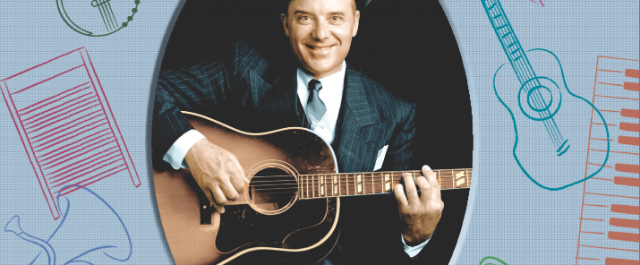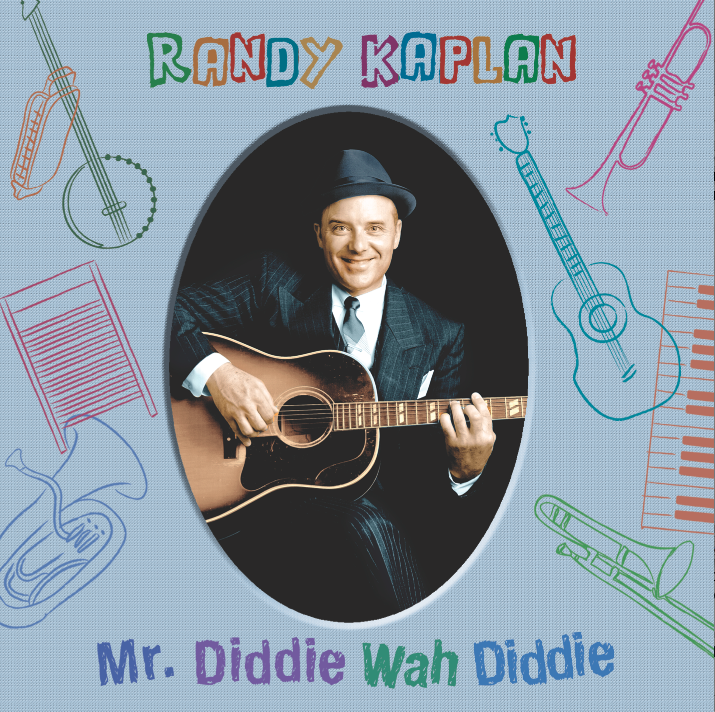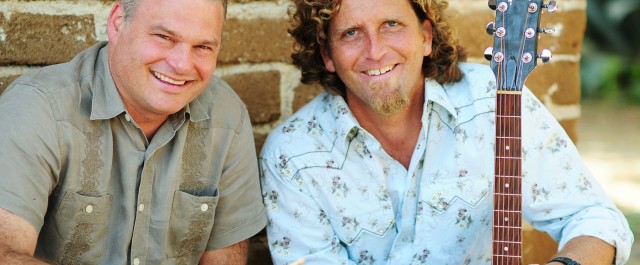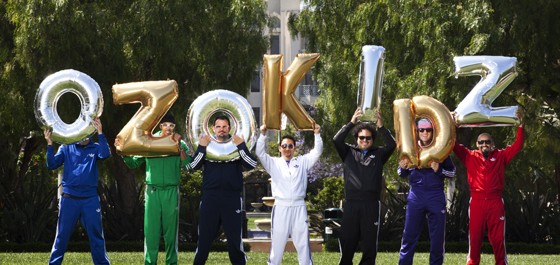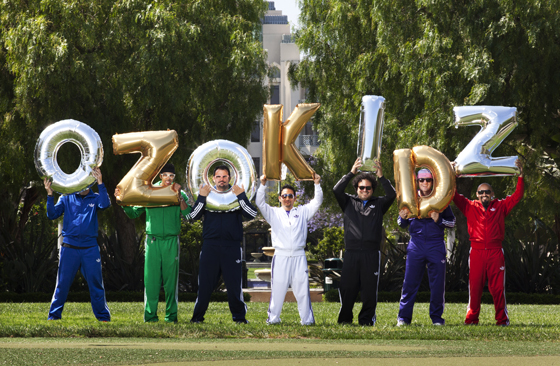Randy Kaplan is new school with tip of the hat to the old school. Actually, he’s fully immersed in old school blues. Randy’s gift lies in sharing the blues, yet telling a story the kids can connect to. He doesn’t take shortcuts or cut corners. His latest album, Mr. Diddie Wah Diddie is 24(!) tracks long and comes with a 20(!) page CD insert. Considering the attention span of most children, it’s daring to release an album of that length.
Randy and his team have just also launched, The Ice Cream game a fun computer game that you can play with your children.
Mr. Kaplan was kind enough to take time out of his schedule to talk about the business side of the kids music scene.
How did your relationship with the My Kazoo TV people to release this album compared to how you were with your three previous records?
Richard Ellis and I had been meeting on and off for a few years. The beginnings are murky. I don’t remember where he first saw me. He must have seen me perform in New York somewhere, because that’s where we kept meeting. And he kept telling me about his MyKazooTV and MyKazooMusic when it was in its incipient stages. And he said they were working on a deal with a major label and he definitely wanted me to work with them. And you know it was something we…it was just on the back burner. I just kept releasing albums independently and then he finally…we met and he said look, I got a deal with Universal and we want to sign you. So, that’s how it came about. Then we got serious about figuring out a way to work together and…and so far, so good.
Was there a sense of relief having the label support behind it rather than having you having to do a majority of the legwork on your own?
Yeah, it’s interesting because overall I’m very excited to be with Kazoo who, you know it’s also Universal Music, but it’s definitely a mixed bag in the sense that I…I never was happy with self promotion or doing all the business end of stuff, but being forced into for my three kid’s records, I think have eight or nine adult records out and I’ve had to do all that stuff totally independently. Grass roots, do it yourself, all that stuff. And I….I never liked it, but I always was the one who was in control, and I kind of got used to that. So now, you know with other people that have serious input, it’s…it takes a lot, you know whether it’s ego wise or just creative wise to be like OK, I have to consider these other things, but ultimately it’s definitely a relief that I…that I have this team behind me. You know that is in constant email contact me and you know has concerns with the artwork, and the songs and everything. And so, ultimately, it’s good, but there is like that part of me that’s…you know it’s hard to…it’s hard not to be the one that does everything.
Right. You go from being in control of absolutely everything to not being in control of absolutely everything.
Right. Which is kind of what I always wanted. I wanted help in the business end, especially. And the good thing about this is that this first project we worked on was like definitely not like how you’d….how you’d put on…you know you wouldn’t design this project in advance to be the one to work on because it’s like a total concept album with…it’s really long, and there’s tons of licensing clearance issues. And I’m sure they were like what the heck do we have to…this is Randy’s first thing he’s giving us. But I got everything I wanted on the record, the audio, and the artwork and everything is exactly how I wanted it. I couldn’t be happier with that.
Now, do you think you were able to, knowing that the business was going to be taken care of, did it allow you to focus in on the music 100%?
Yeah, now what I said is, we wouldn’t have chosen this project. The project was already in midstream when I signed on with MyKazoo. So, I had already done the bulk of the recoding and it was almost…and the artwork was kind of just starting to be made. So it was…most of the creative work was done when I signed. Then of course…except for the artwork took a long time, because it’s a 20 page booklet with photos, and liner notes, and everything. So, I just had to fight a little to get the exact…you know they wanted me to cut some songs maybe, or they were concerned with the length, and you know that took a little finagling. But I got it. So, yes, I kept saying look, for our second record together, I’ll do a ten song record of all originals, no licensing, no covers, whatever you want you know. So it worked out. It’s like a bargaining chip, options for the future.
Right, because when this album came to me, I’ve only been paying attention to children’s music for about the last two years or so. And every kid’s album I’ve seen, it’s maybe ten, eleven, a max of 12 tracks. And you practically doubled that with this one. Was there ever any thought to say let’s do half of one album. Let’s do 12 tracks for one here, and then 12 tracks for a second album one year later because maybe the audiences and the kids aren’t ready or the parents aren’t capable of sitting down and listening to a 24 track record with their kids?
Right. Well, I was very passionate that it had to be this way. And my first three albums were 17 track records, and there’s some really long songs in there like my version of ‘You Can’t Always Get What You Want’ is ten minutes, and it’s never a problem. Kids listen to the whole thing and sit there. And I’m like wow, they have better attention spans than the adults sometimes. But my argument, first, it’s like a concept record. So, I wanted all my guitar heroes to be represented. You know there’s a few I had to leave out, but it’s also a concept record in that I am doing dialogues throughout teaching blues history and trying to come up with the a blues man name for me. And so you know so once that was set, you couldn’t really cut out songs. They were like, look, especially for a kid’s record, how could it be this long? And I said well, for a kid’s record especially, it doesn’t really matter how long it is, because in my experience the family gets in the car, puts on the CD and the kid gets fixated on maybe song three and wants to hear it over and over again. They don’t even get to the second half of the record for three months. You know and then they have a wealth of material at their disposal for a year’s worth of entertainment. I really feel like how it is. Like my other records, you hear first the praise for the first half of the record, then later oh, we just listened to this one, song number ten. You know so it comes around like that. It’s not like you’re a teenager coming home with headphones, and sitting on your beanbag chair, and listening to the entire record and reading the liner notes. These are, three to eight year olds in a car, mostly. This is how I imagine them listening to it. So, I felt the length was kind of an irrelevant issue. It seemed like it would be like a major thing. Like oh, kid’s records should be short. It really seemed logical when you actually examined it.
Exactly. We’re in the car and maybe five tracks into a record before we’re at the store and that’s all they want to hear when we get back in. Those first 5 songs. I can always tell if it’s a good album if they say “again.”
Right. Exactly.
If they say again when the song over, that means they’re loving this, and we go back and we listen to that song five consecutive times.
Exactly. Yeah. And with that I mind too, I try to design my music, and I hope I succeed at it, in like having the adults be able to listen to the same song five times in a row without wanting to tear their hair out. Sometimes any song you want, if you have to listen it over and over again, you’re like oh, come on. So, I try to put as many levels as I can in there, where the kids aren’t going to get every joke necessarily, or every word play thing where adults will. The song will hopefully hold interest for adults as well as the kids with the repeated listenings.
“Ice Cream Man Rag” by Randy Kaplan from myKaZooTV on Vimeo.
Now one of the things you’ve talked about is the liner notes. And to me that almost seems to be a lost art nowadays. Where so many people are just downloading the album via iTunes or Amazon or CD Baby or wherever. It’s always just the MP3. So why did you take the time to put together such a unique, and informative package to go with the actual hard copy CD?
I’m like an old time, old style guy, too. I lament the loss of the big LP where you could hold it in your hand, and the pictures are much bigger, and then at least with the CDs, with the CD booklet, I lament the loss of that. With kid’s music especially, I feel like the physical CDs are bought often. I don’t know how many people actually read the liner notes, and as extensively as I‘d want them to from my other records. The first three records have short liner notes, but they get increasingly longer, you know where by my third one I was doing a liner note for my last adult record. Songs For Old Lovers I did…there are extensive liner notes in the style of like a Frank Sinatra record from the ‘50s or ‘60s. So that got appreciated. So, that was a concept record, too, my last adult record, which was I wrote songs as responsive to pop songs from the ‘40s and ‘50s, like Sinatra-eseque, Peggy Lee type songs. So, there were liner notes in that. So for this I wanted to do the same thing, and I’m real…I was real passionate about it and loved putting the packaging together, and my hope is that some people will read it and maybe I will post it online for the folks that like to just download stuff from MP3’s. We’re trying to show with this record that it’s a…it’s kind of a educational in a way, because I’m not really an educational type singer where you go to the show to learn something, but you know we have this amazing heritage of music in the United States of which blues is a huge part. So, I’ve been into the blues and ragtime music for a long time, but just putting together this record, and doing all the licensing, and researching the songs, I learned a ton of stuff. I find it fascinating. So, I just hope that it will wear off…rub off on other people and they’ll find it fascinating too. You know we have these mythological American characters, Robert Johnson, and those guys who we hardly know anything about. And these guys formed American music. You know everything was influenced by them. Just magical, magical guys in our past hundreds…hundreds of years ago.
You don’t seem to take the easy route on a lot of these things. You kind of dig in and make this really authentic and allow both the parents and the kids to really kind of dig deep, don’t you?
Yeah. I try to do it so that it’s both entertaining, and then if you want to go to that level of saying oh, what is he really doing, you could find out. You know I would have loved to have like a companion CD go with this where it shows all the influences, because for Mr. Diddie Wah Diddie, I took Robert Johnson’s song, for instance, ‘Kind Hearted Woman Blues’ and changed it to ‘Kind Hearted Babysitter Blues.’ So, I made a CD for my friend Scott, who is also what I built in as my creative consultant, because he just has so many amazing ideas. It was his idea originally to put…you know get Lightning Boskins to sit there with me and talk about the song. So, I made him a CD. It was a double CD, it turned out to be, because I staggered the original influences with like my…my songs, how they came out. He was like “oh, this is the best. I wish I everyone could hear this.” So you hear like Robert Johnson singing ‘Kind Hearted Woman Blues’, then me singing ‘Kind Hearted Babysitter Blues.’ You hear Bessy Smith singing ‘Black Mountain Blues,’ then my version. So, that kind of stuff I always hope people you know read the liner notes and want to hear the originals too, because you know that the lyrics aren’t always appropriate for kids, which is why I wanted to change everything and put out a blues record for children. But still that’s just amazing, these original versions. So yeah, never the easy way out. That’s true.
I’m curious how easy is it to turn off the adult record writing and write for the kids? Do you find it bleeding over at all or is it pretty cut and dry with how the songwriting process goes for you?
I don’t really think about it. I know certain songs of mine started out as adult songs that I just…that changed to kid’s songs real easily. For instance, Loquat Rooftop, you know my second kid’s record. That was not a kid’s song. It was an adult song. I didn’t change anything. I made it a kid’s song and I just said, oh, I will change it out…instead of saying loquat, I’ll say, lo, lo, loquat in the chorus. That’s the only change in the whole song, and it’s some people’s favorite song. It’s like a sweet, nice song. My friend Mike West, he’s also the producer, just illustrated a children’s book about it. So, it’s like that’s…something like that. Or my song ‘Roaches’ from my first record, Five Cent Piece. You know it’s about roaches. It was just a song I used to sing when I lived in the East Village. People like totally related to it because everyone had roaches in the East Village apartments in those days. And then I just changed it to a kid’s song by adding the voice of the roaches during the instrumental. And it…you know so stuff like that of course is a difference. I…you know my adult songs that I have written in the past 20 years are all about kind of dysfunctional relationships and (laughs) for kids. But yeah, the kid’s songs for instance, my friend had like a little salon party a few weeks ago, and she asked me to be one of the people who performed. So I play a couple of my more funny songs. Also the kid’s songs wind up informing my adult music, where my adult shows now, which are however few and far between, are kind of fun, and funnier than they ever used to be because I…I’ve just learned from singing for kids what…what is an entertaining thing, and what is fun to play. So, anyway, I played my two adult songs, and then Laurie, the person who did the party, said oh, you should play them one of your upcoming kid’s songs from the blues record. And I did and that was the biggest hit of the night for me. Like they wanted to hear more kid’s songs. You know because there’s a level in the kid’s songs that the adults like, too. So, it does kind of blend in a way where I’m writing with you know multi levels going on. So, I still do write some songs, and I’m like oh, I could never sing this for kids, but for the most part nowadays, I’m writing for a children’s audience with adults in mind also.
It’s hard for artists to make money via the CD sales route. There is revenue there but there’s always that break even point where it costs so much money to produce the records, and things along those lines, where a majority of revenue for artists come via shows, and gigs…are you able to make the kid’s aspect of your career, is it enough to where you are comfortable and you can make a living off of? I’ve only seen that you have a couple summer tour dates this year, not a whole lot of live shows.
Right.
So how do you as an artist find a way to justify the time, the effort, the energy to make it financially, not necessarily successful, you don’t have cash flowing all over the place, but to make it worth that time and effort?
Well, the majority of my income comes from royalties. I’m really lucky in that the Sirius XM radio, plays my stuff all the time. And you get royalties from that, from ASCAP, which is my song writing and composer society that I belong to, but also from Sound Exchange, which pays royalties for both the sound recordings, sound recording owner and also to the main performer of songs. So, now my Sound Exchange royalties are going to go down with My Kazoo, because My Kazoo and Universal now own the sound recording of this new record. But I am still the principle recorder, recording artist, so I’ll get the Sound Exchange royalties, and of course, I’ll get the ASCAP royalties. So, that’s actually my main source of income these days. And live shows, I’m assuming there will be more coming up, but I try to do ones that you know pay relatively well. You know I used to just go all over the place and play for basically nothing. And I know everyone argues just do the show, it’s good for exposure. You know so those days are kind of luckily coming to an end, where now I can say well, yeah, I’ll go and play anywhere. You know people write me, “when are you coming to Texas?” I’m like I’m ready to go right now. It’s easy to get me to come. Even if it’s like a private thing, you pool together ten families and each chip in and then that’s enough to get me to fly anywhere and put me up in a hotel. It’s kind of easy. So, luckily, my New York contacts and my L.A. contacts, the two main places I lived and played, I have certain gigs that happen a couple of times a year, which actually pay pretty well. But yeah, I fly to Denver, St. Louis and those places, do what I just said. They say hey, we want to sponsor a concert. They just offer me and we make a deal. Like alright, give me this amount of money for flying, and for putting me in a hotel, and then I’ll come out there and I’ll play, and so far it’s been great. I’m hoping that will increase. And also, definitely what you mentioned, when I was single, it was easy to eek out an existence and squeak by. Now I have a wife have a kid, and (laughter) it’s way more expensive than I thought it was. So, yeah, we’ve got to step up things to the next level with MyKazoo and Universal, hopefully, so we can keep this viable.
For more information on Randy visit RandyKaplan.com and don’t forget to pick up a copy of his newest album Mr Diddie Wah Diddie.
